KARACHI/ISLAMABAD: The director general of the Pakistan Sports Board (PSB) has said there were plans to restructure the body and introduce a new sports policy to turn the tide on a decades-long decline of sports in the country, with sportspersons and independent experts blaming Pakistan’s dismal performance at this year’s and past Olympics on institutional wrangling and a lack of funding and training facilities for athletes.
Pakistan is now 18th in hockey rankings after being consistently among the top four and winning a record four World Cups. The nation has not won a single medal at the Olympics since 1992.
At the Tokyo Olympics that concluded last weekend, only two Pakistanis impressed.
Weightlifter Talha Talib, competing in the 67kg men’s contest, was at the top of the race before being surpassed by athletes from China, Colombia, and Italy in final attempts. There was national jubilation in Pakistan last week when Arshad Nadeem qualified for the javelin final. He finished fifth.
Though Talib and Nadeem managed to raise national spirts momentarily, their near misses have once more raised an oft-asked question: How did sports-loving Pakistan, which once prided itself on producing extraordinary athletes, fall so far behind?
Col (R) Atif Zaman, the director general of the Pakistan Sports Board (PSB), said the “politicization” of sporting federations and the violation of merit in the selection of players were the main reasons sports had suffered in Pakistan in recent years.
Zaman was appointed to head the Board in March this year.
“We plan to restructure the Sports Board and bring in a new sports policy under the vision of Prime Minister Imran Khan which will fix the problems leading to a decline in sports, especially the Olympics,” the DG told Arab News. “We are forming an election commission and dispute resolution committees, which will hold elections of different sports federations.”
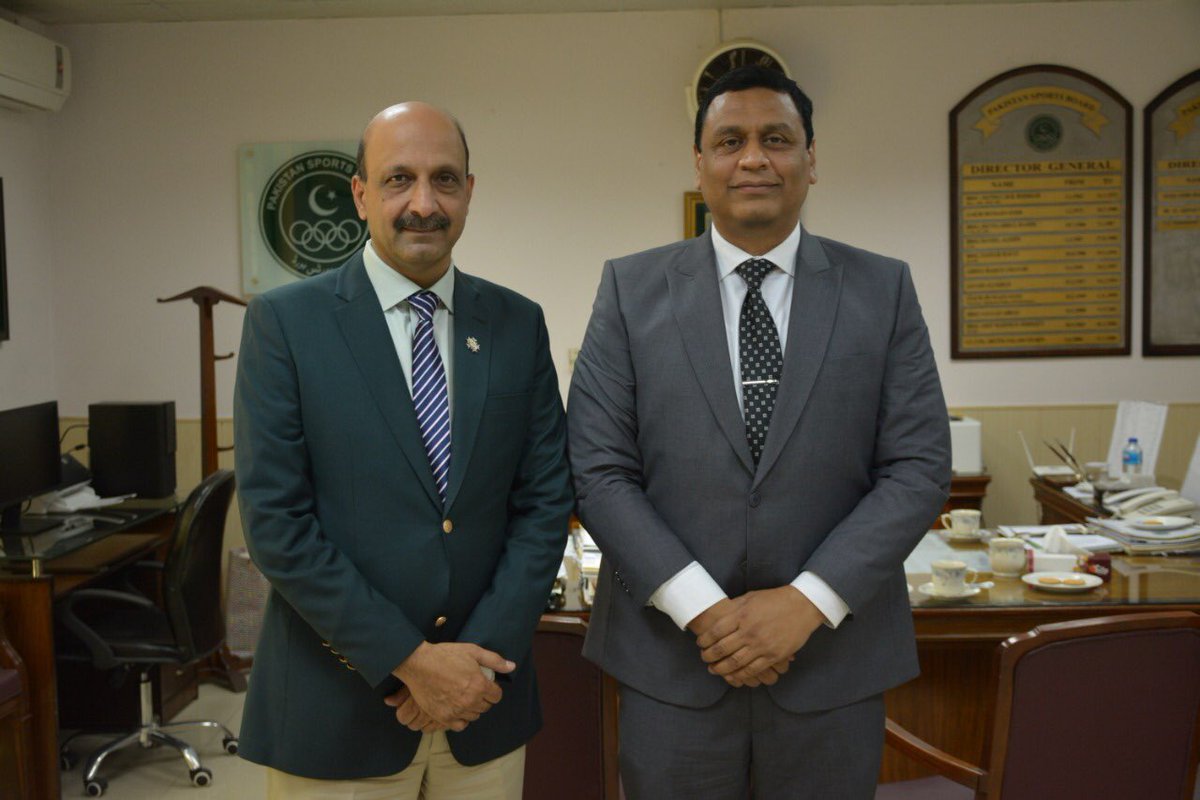
Director General of Pakistan Sports Board, Col. (R) Muhammad Asif Zaman (left) meets President Judo Federation, Col. Junaid Ahmed at Pakistan Sports Complex in Islamabad on June 23, 2021. (Photo courtesy: Pakistan Sports Board)
Most importantly, Zaman said, the Pakistan Olympic Association (POA) would be regulated.
“POLITICAL INTERFERENCE”
Formed in 1948, POA is the sole representative body of the International Olympic Committee (IOC) in Pakistan and operates exclusively under the Olympic Charter. It is headed by Lt. Gen. (R) Syed Arif Hassan, the second longest serving president after his predecessor Syed Wajid Ali, who served from 1978 till 2004.
Hassan, and POA General Secretary Muhammad Khalid Mehmood, did not respond to Arab News questions seeking comments for this story.
But in a statement released on July 27, the POA blamed the Inter-provincial Ministry (IPC), headed by Dr. Fehmida Mirza, and the Pakistan Sports Board, for the decline of sports in the country.
“The POA is not responsible for sports development in the country,” the statement said. “This is the responsibility of PSB and it is clearly stated in their own rules which are available on their website.”
“Existing facilities and financial support for our sportspersons are the lowest in the region despite which our athletes have made tremendous strides in their respective sports events, as is evident from Talha Talib’s performance,” the statement said.
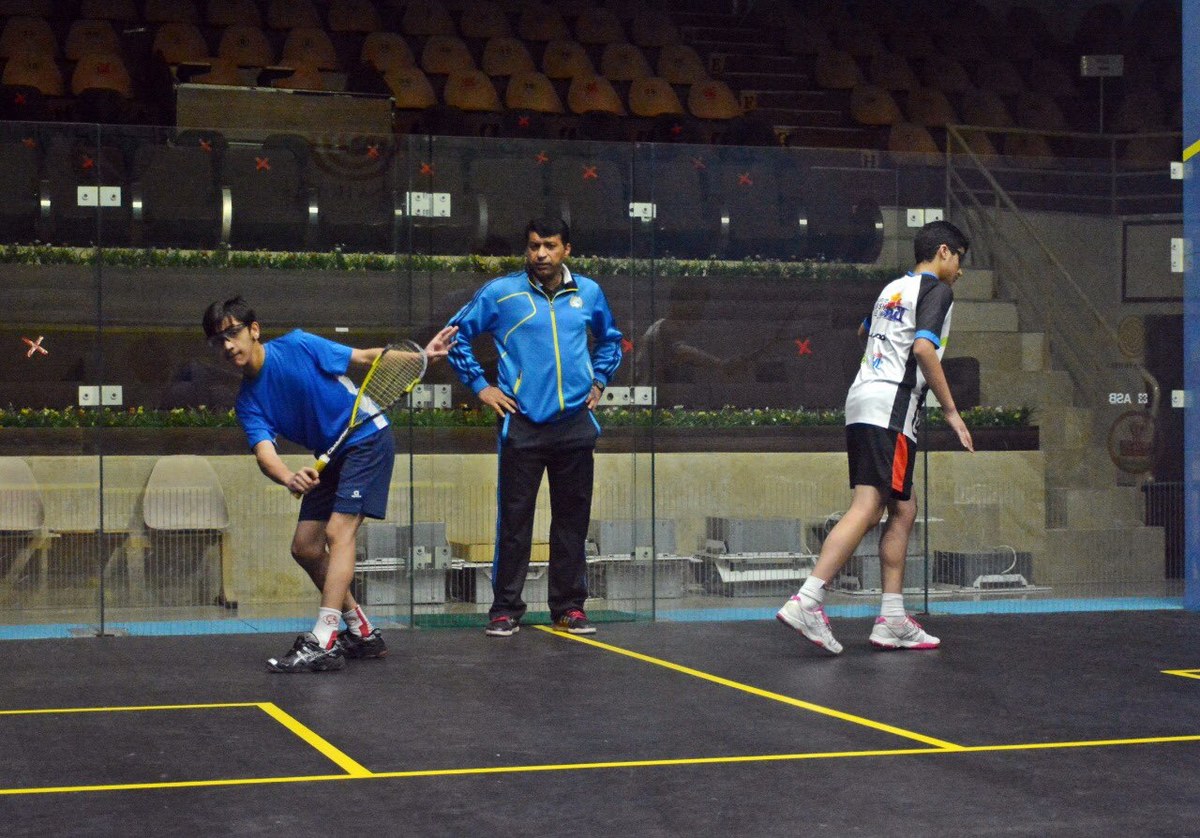
Boys play squash in Pakistan Sports Complex Islamabad on March 12, 2021. (Photo courtesy: Pakistan Sports Board)
Mohsin Mushtaq Chandna, Secretary Inter-Provincial Coordination Division, who spoke on behalf of minister Mirza, told Arab News the ministry had allocated $3.65 million to improve sports in Pakistan and was hiring foreign coaches. However, he admitted to the need to revamp the nation’s entire sports infrastructure to better prepare players for international competitions like the Olympics.
“The foreign coaches for different games will train our sportsmen for the South Asian Federation games that are scheduled to take place in March 2023, and this will help kickstart our revival in sports after a long time,” Chandna said.
About POA, he said: “We are committed to extend all our support to associations and federations to improve the sports infrastructure in the country, but they should also shun politics and ensure selection of players on merit.”
On Monday, Geo News quoted Fehmida Mirza as saying the Olympic Association was “interfering with and controlling every matter which is not their job … the POA is not allowing the government to play its role.”
But the PSB DG defended the Board against these accusations, blaming sports federations and the POA instead, particularly for the country’s poor performance at the Olympics.
“The POA is responsible for selections, it also issues accreditation, appoints chief of the mission,” Zaman said. “So what is the role of PSB?”
“Federations need to be vibrant, and the government should facilitate them but federations haven’t played their role,” he said.
Under a new sports policy, Zaman added, a regulatory authority would be to “fix the things and help promote talented athletes to the top.”
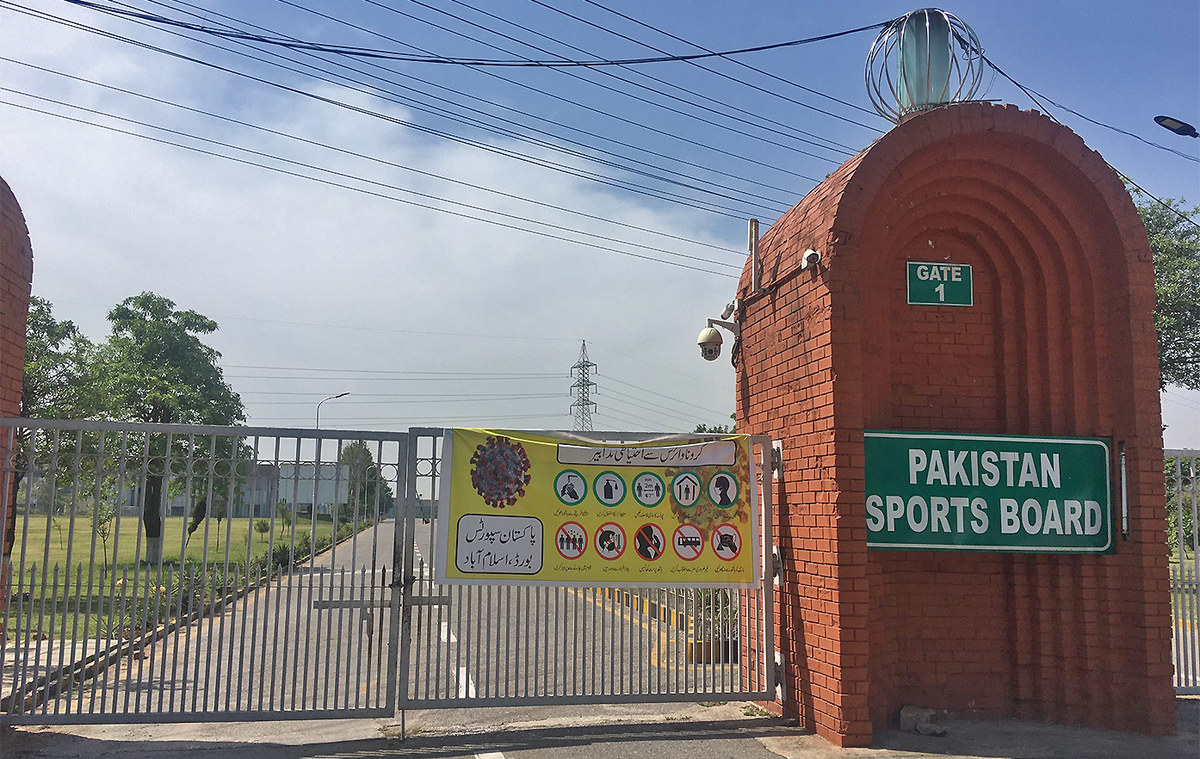
The pictures shows exterior view of Pakistan Sports Board in Islamabad, Pakistan, on April 28, 2021. (Photo courtesy: Pakistan Sports Board)
“TALENT HUNT, SPECIAL FUND”
Former Olympians were not convinced.
“Pakistan wants readymade athletes and doesn’t want to invest in sportspersons,” Kiran Khan, an Olympic swimmer and one of the first international female swimmers from Pakistan, said. “If the government doesn’t support us, athletes will vanish from the country.”
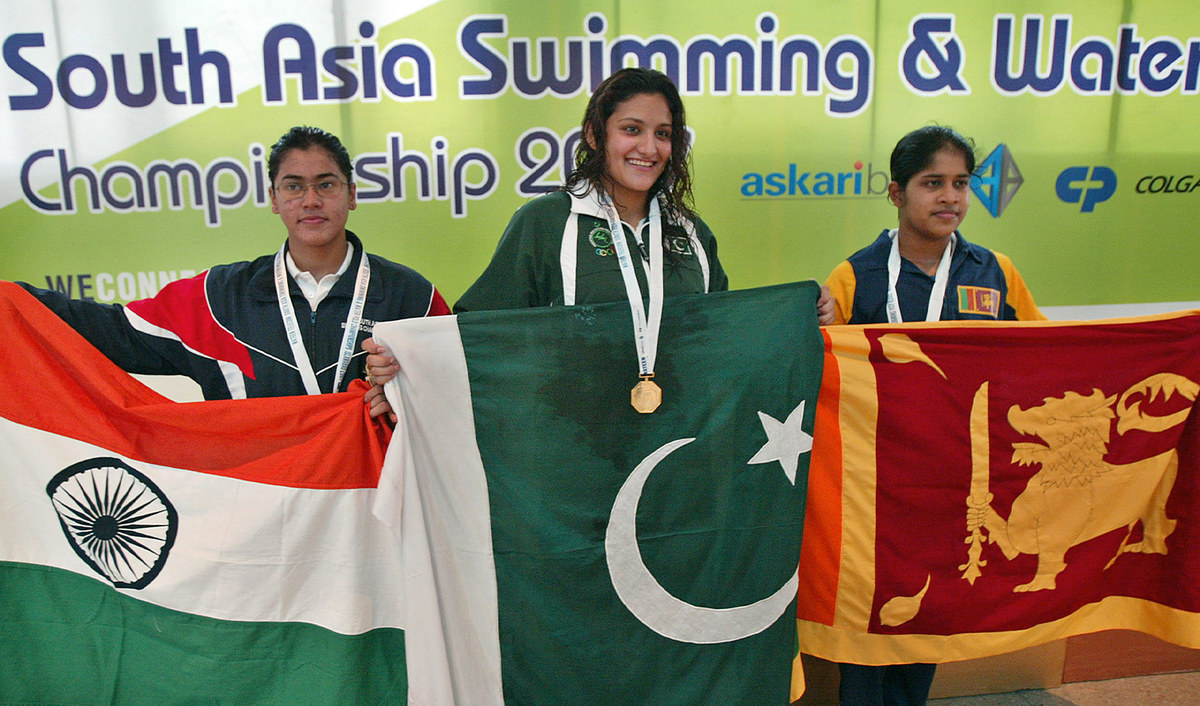
Pakistani swimmer Kiran Khan (C), Fariha Zaman from India (L) and Niniruwani from Sri Lanka hold their country flags at the end of the 50 metre butterfly race in the South Asian Swimming and Water Polo Championship at the Sports Complex in Islamabad, Pakistan on September 3, 2007. (AFP/File)
The Pakistan Sports Board’s budget for 2021-22 is Rs 1 billion ($6 million). In comparison, New Zealand, a country with a population of five million compared to Pakistan’s 220 million, has a sports budget of $265 million while Australia, with 25 million people, commits $136.3 million annually for sports.
Pakistan has also struggled to spend its yearly sports budgets. The PSB confirmed that Rs44 million of its budget for last year lapsed, blaming the coronavirus pandemic for limiting sports activities and training, due to which less money needed to be spent.
But at least six former athletes questioned by Arab News directly blamed PSB for the decline in sports and Pakistan’s poor performance at international contests.
“Sports federations have a responsibility to provide players, and POA is a selection body but the primary responsibility lies with the Pakistan Sports Board which has to groom players, provide them training,” swimmer Khan said.
Saadi Abbas Jalbani, a former captain of the Pakistan National Karate team, agreed that the responsibility lay with the Board.
“It has the responsibility to train and groom sportsmen,” he said, adding that Pakistan’s downward journey in sports started in 1988 when “we brought politics into it.” 1988 is the last time Pakistan won an individual medal at the Olympics.
Senior sports journalist Faizan Lakhani also said a “major chunk of blame” went to the Pakistan Sports Board since it was in charge of both the infrastructure and funding for sports in the country.
That sports was not a “priority” for the government, he said, was reflected by the fact that PSB did not have a full time DG for over two years until one, Zaman, was appointed in March this year. He also lamented lapsed budgets of the Board.
“Keep a special fund of 400 crores under the Olympic program. Spend four to five crore on each athlete per year, provide them training, coaching, all technical facilities,” Lakhani said. “If you do this with sincerity, I’m sure these athletes can bring laurels.”
Muhammad Inam, a freestyle wrestler who shot to fame after defeating Indian opponent Anuj Kumar at the 2010 Commonwealth Games where he won a gold medal, agreed that Pakistan needed to invest in training and follow models adopted by top sporting nations.
“For the 2008 Beijing Olympics, China selected kids in a talent hunt in 1996. Better results can be achieved through long term planning,” Inam told Arab News. “But in Pakistan, the last camp was held a little before the Asian games in September 2018. What results can one expect in such a short period?”
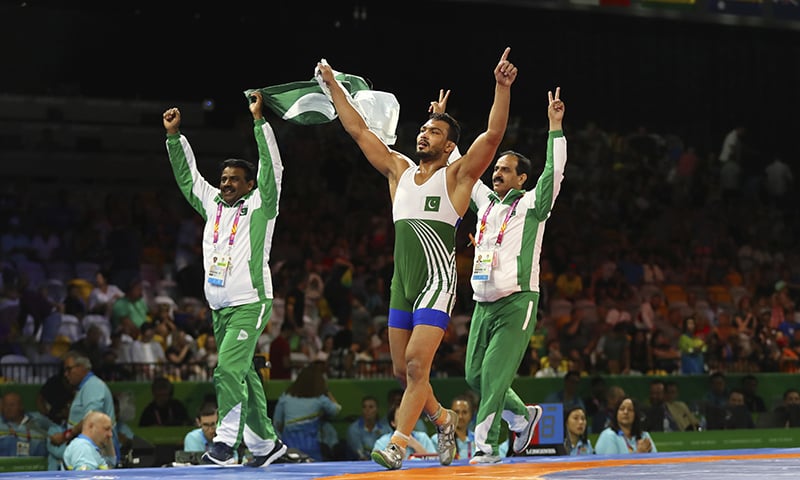
Pakistan's reestyle wrestler, Muhammad Inam (second right) celebrates after winning the gold in the men's Freestyle 86kg gold medal match against Melvin Bibo of Nigeria during Wrestling on day 10 of the Gold Coast 2018 Commonwealth Games at Carrara Sports in Australia on on April 14, 2018. (AP/File)
Zaman said all this would change now that the PSB was putting together an elite pool of children for training, and would soon unveil a new sports policy.
“We will directly train them, will provide full sport in diet, training and will monitor them through technology,” he said. “In the new policy, departments will be eliminated, and games will be revived at the tehsil and district levels.”

















